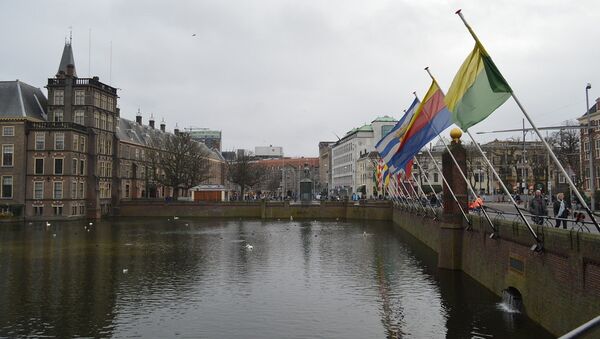In the spring of 2014, Brussels joined Washington in punishing Russia for the crisis in Ukraine by hitting Moscow with diplomatic and economic sanctions.
Russia responded immediately by banning some European foods. For the Netherlands, a country that has been exporting goods to Russia for decades, sanctions came like a bolt from the blue.
From the moment the sanctions and the retaliatory embargo were introduced, Evo and Fenedex –the two Dutch organizations that help domestic enterpeneurs reach foreign markets, began holding talks with the country’s government.
EVO communications advisor Raymond Mens told Sputnik, that in the beginning no one was discussing why sanctions were imposed, exporters and manufacturers wanted to know the new rules of the game:
We said that the only thing that we want to do is to make sure that the sanctions put in place are as clear as possible, so companies that do business there or want to business in Russia know which products they can and can’t export, so what we tried to talk about with the ministries is how can we make sure that the lists of products that can’t come into Russia will be published as soon as possible.
According to the Dutch Center for Statistics, as a result of Moscow’s embargo, Dutch companies experienced the biggest decline in meat, butter and cheese exports to Russia – it’s almost zero now. Fish exports dropped by 90%, vegetables – by more than half, coffee – by 30%, livestock transport – by 40%.
Someone had to pay the piper, and it didn’t look like the EU bureaucrats were the ones willing to pick up the tab in full.
In Holland I duscussed sanctions with Roland Mens and Godfried Smit from EVO-organization that helps Dutch exporters reach foreign markets. pic.twitter.com/Nf3dj23tDk
— Denis Bolotsky (@BolotskySputnik) 28 декабря 2016 г.
Godfried Smit, the senior project manager at EVO, told Sputnik that the EU’s compensation measures only covered part of the damage.
There was only a small fund available only in Brussels to compensate more or less the reduction of exports into Russia, but it didn’t cover the whole damage, I think it was 10%, or something like that.
Following the introduction of the embargo, Russian dairy farmers flooded domestic market with their own versions of Gouda cheese, Parmesan and Hamon. But it was hard for them to master the art of cheesemaking from scratch, without the knowledge and the equipment in which exists in Europe.
However, it doesn’t look like the sanction wars will go on forever. With more and more European politicians opposing confrontation with Moscow, and with US President-elect Donald Trump hinting at his readiness to improve relations with Russia, things may change rather quickly.
In December of 2016 at the annual news conference in Moscow, Russian president Vladimir Putin said that Moscow is prepared to lift the embargo if Europe cancels its sanctions.
#Sanctions: Russia will cancel retaliatory measures, if the EU lifts sanctions
— President of Russia (@KremlinRussia_E) 23 декабря 2016 г.
If the door of opportunity reopens, the Dutch are ready to resume exporting their goods to Russia. However, according to Godfried Smit, it will not be the same market as before:
Russian economy also suffered and it will be difficult for a lot of Russians instantly to afford the products which are nowadays abolished from the Russian market, and then some will probably stay with the imitations, because they are cheaper.
In December of 2016 the EU prolonged its economic sanctions against Russia for a further six months, until July 31st, 2017.
Currently restrictive economic measures prohibit European companies from cooperation with whole sectors of Russian economy, including energy, banking and defense. EU’s diplomatic measures also affected 152 Russian individuals, whose assets in Europe were frozen, and who were prohibited from entering the EU.
We'd love to get your feedback at radio@sputniknews.com
Have you heard the news? Sign up to our Telegram channel and we'll keep you up to speed!


